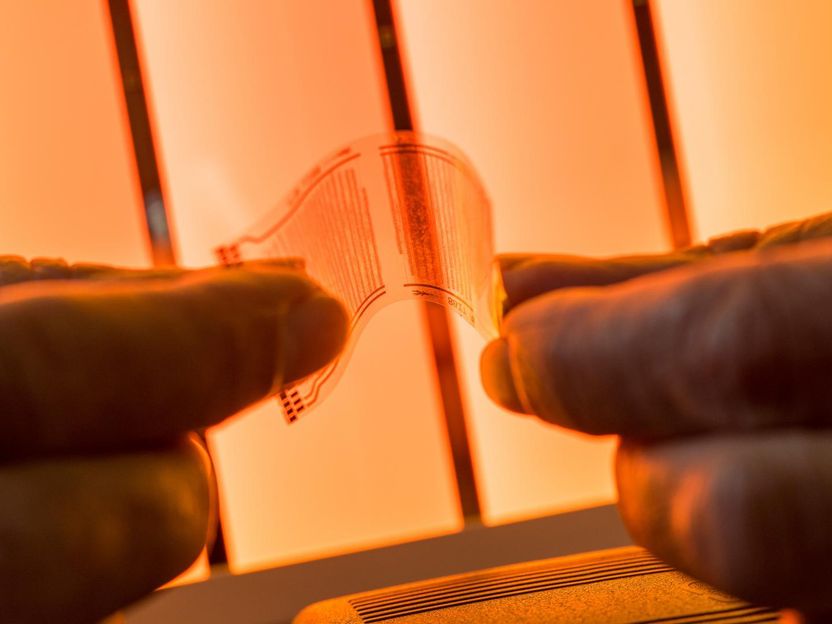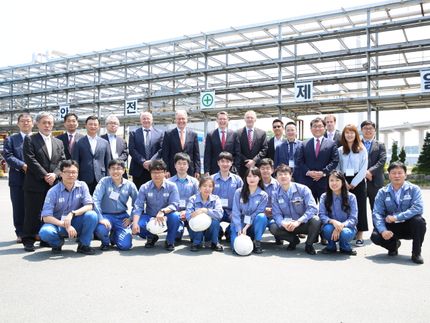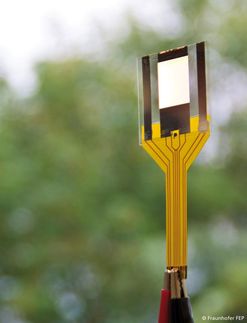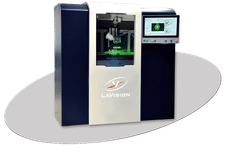EU project helps boost 'organic' electronics
Light-up clothing, medical sensors and electronic wallpaper are just a few of the possible future applications that may be enabled by flexible and printable electronics using carbon-based materials.

The EXTMOS project will help develop new organic semiconductor materials and additives that can be printed onto flexible film to create devices that are low cost, flexible, wearable and lightweight.
Nic Delves-Broughton, University of Bath
EXTMOS (EXTended Model of Organic Semiconductors), a €5 million pan-European collaborative research project led by the University of Bath, will help develop new organic semiconductor materials and additives that can be printed onto flexible film to create devices that are low cost, flexible, wearable and lightweight.
Organic materials are used in applications such as flexible displays, billboards and low energy diffuse lighting and wearables. They also have exciting potential for the Internet of Things, where electronics are embedded in objects and transfer data without human intervention.
The EXTMOS project, part of the EU Horizon 2020 research and innovation programme, aims to reduce the time and effort involved in manufacturing and testing new materials and hence lower the production costs.
Project leader Professor Alison Walker, from the University of Bath's Department of Physics, explained: "Currently the process of developing and testing of new materials is very time-consuming because of the high number or permutations of structure open to organic chemists. This project aims to develop the tools to enhance decision making concerning which materials are synthesised for a given target device performance.
"By theoretically predicting the motion of electronic charges, we will be able to test out new materials in a virtual environment before making and testing the most promising materials combinations in the lab. This process will accelerate development of new materials and device structures."
Dr Enrico Da Como, also from Bath, commented: "The EXTMOS project is taking a new approach by sharing ideas in a network across multiple disciplines to make a model that will predictably identify a new generation of materials."
EXTMOS is a pan-European collaboration of 8 academic partners: the universities of Bath, Mons, Bologna, the Karlsruhe Institute of Technology, the research institutes of Nanosciences et Cryogénie of the CEA organization and the Institut Néel in Grenoble, the Max Planck Institut für Polymerforschung, Mainz and Imec, Leuven along with 4 industrial partners: Novaled, FlexEnable, Silvaco Europe and Nanomatch. US advisors are Antoine Kahn, Princeton, Roland Faller, UC Davis, Ana Claudia Arias, UC Berkeley.
Other news from the department science
These products might interest you
Most read news
More news from our other portals
See the theme worlds for related content
Topic world Sensor technology
Sensor technology has revolutionized the chemical industry by providing accurate, timely and reliable data across a wide range of processes. From monitoring critical parameters in production lines to early detection of potential malfunctions or hazards, sensors are the silent sentinels that ensure quality, efficiency and safety.

Topic world Sensor technology
Sensor technology has revolutionized the chemical industry by providing accurate, timely and reliable data across a wide range of processes. From monitoring critical parameters in production lines to early detection of potential malfunctions or hazards, sensors are the silent sentinels that ensure quality, efficiency and safety.
































































